5th Apr 2023
Last May we shared how we are focussing our efforts on supporting clean energy and nature, in addition to what we do via our core services and business practice. Nearly a year on we feel that these issues are just as important as ever, if not more. So here's an update on how we are expanding on what we already do and the causes and organisations we are backing.
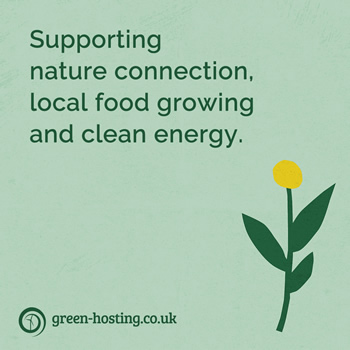 It is now commonly understood that access to green spaces positively affects our wellbeing. Better still, real connection, such as conservation activities and growing food and flowers in harmony with nature brings a whole new level of understanding about the natural world and our place in it.
It is now commonly understood that access to green spaces positively affects our wellbeing. Better still, real connection, such as conservation activities and growing food and flowers in harmony with nature brings a whole new level of understanding about the natural world and our place in it.
Keep nature healthy = keep ourselves healthy.
I (Vic) am a keen nature lover. I garden at home and I spend time walking with our dog in various natural environments. Additionally, over the past few years I have been involved in local urban community gardens and gardening. I know how fortunate I am and I know all too well that there are many people who do not have this kind of access to nature. On top of this, nature is being threatened by harmful legislation, corporates prioritising profit over the planet and the continuation of destructive developments like HS2.
There are individuals and organisations everywhere who are experts in nature conservation and organic food growing, particularly the unsung heroes in inner-city community gardens. Here you will find a wealth of knowledge and experience that anyone can tap into for free, not to mention a fierce passion for the environment and a deep care for people and their access to healthy food and time outdoors. On a wider scale there are regional and national charities working hard to shine a light on eco injustices and tackling them head on. These are the people we look to for guidance on how best to support.
So below, is an outline of where we are focussing our support this year and will review again next year to see what is effective, how we can best help and more we can do in our capacity as a small business.
The food system is quite broken. Out of season fruit and veg are flown thousands of miles to be packaged and then to a supermarket shelf. Soils are massively depleted, harmful chemicals are sprayed on crops and bees are farmed at industrial levels to pollinate fruit grown in unnatural environments. At a time when people are going hungry, there needs to be more accessible, affordable food that isn't just healthier for the people but for the planet too.
Current renewable energy solutions may not be perfect but we believe we should continue to support it's growth.
Through the activies listed above, we are working towards Sustainable Development Goal 15 'Life on Land'. See our Impact page for details about the sustainable development goals we focus on.
31st Mar 2023
 The UK's biggest online craft fair, Folksy has launched a new directory of ethical and trusted providers and we're in it!
The UK's biggest online craft fair, Folksy has launched a new directory of ethical and trusted providers and we're in it!
We are delighted to be listed alongside some great suppliers and services for artists, designers and makers. You'll find us under the 'Packaging, Apps & Services' category (or scroll to the bottom).
We are offering a 20% discount to Folksy members on all of our Green Hosting plans. So if you're looking to switch web hosts or create a new website then head over to Folksy to get your discount code.
If you're not a Folksy member and you're interested in signing up to Green Hosting, we can give you a discount too. Just drop us a line.
Check out the Folksy Trusted Suppliers Directory here and see the fabulous Folksy marketplace here.
20th Mar 2023
Back in November 2019 we were looking for additional ways to continue to support clean energy via Green Hosting. We already did this by using renewable energy for our website hosting service and for our office base. We promote the use of renewable energy, design websites that run efficiently so as to consume less energy and provide information and guidance on ways others can do this too.
Next we wanted to contribute to action that was having a very direct and real impact on people who may not have access to the same resources and abundance of choice as we do. This is when we found Renewable World, a charity that tackles povery and climate change through off-grid, renewable energy solutions for low-income individuals, families and communities in remote places.
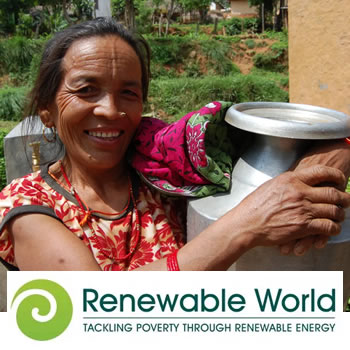 Renewable World have expert understanding and experience of how access to energy and running water impacts individuals' and communities' opportunities as well as their income, independence and health. They also know that the way to make energy and water solutions (and their positive effects) truly long-term and sustainable is to work alongside communities. This is why they do not simply install systems and leave but partner with communities to ensure they are engaged in choosing, building and maintaining their renewable energy solution. They also provide training in a range of fields including technical, financial, agricultural, business and more and ensure that those involved are equally represented across men, women, young people and marginalised groups.
Renewable World have expert understanding and experience of how access to energy and running water impacts individuals' and communities' opportunities as well as their income, independence and health. They also know that the way to make energy and water solutions (and their positive effects) truly long-term and sustainable is to work alongside communities. This is why they do not simply install systems and leave but partner with communities to ensure they are engaged in choosing, building and maintaining their renewable energy solution. They also provide training in a range of fields including technical, financial, agricultural, business and more and ensure that those involved are equally represented across men, women, young people and marginalised groups.
Renewable World focus their support in remote areas of Nepal and Kenya, some of the most underserved communities in the world. Working with people here to develop and sustain energy and water solutions helps build resilience, brings about social change, contributes to climate justice and helps mitigate climate change. Read more on our page about Renewable World about what these energy projects mean in the every day lives of the people who use them.
Since their inception in 2008 Renewable World have reached around 110,000 people and over 150 communities. They have delivered energy solutions capable of:
- generating 1.54GWh of energy per year.
- pumping 336 million litres of water per year.
- mitigating 7524 tonnes of CO2 per year.
Their achievements can be read in detail on their Impact page and in their 2021-22 annual review. Now they have a new ambitious target of increasing access to to clean, affordable and sustainable energy for 500,000 people by the end of 2030.
In 2019 and today, this inclusive approach and impressive results meant that the work of Renewable World was something we wanted to be a part of.
We donate at least 1% of our monthly Green Hosting sales income to Renewable World each month. This money goes directly from us to the charity, without fees being taken by a third party. To date we have donated over £1300. Renewable world state that £20 per month could provide a community with agricultural training and tools, helping them increase their income by growing cash crops, and benefiting up to 500 individuals.
Here's what Renewable World said about our donations
"We are very grateful for the support that you offer us. A monthly contribution is especially valuable, much better for a healthy cash flow!"
Emily Jesshope, Fundraising and Events Manager
So, thank you to our clients who continue to choose Green Hosting. Alogside us, you are the ones who are supporting Renewable World and their wonderful work. See our Impact page to see all of the other positive things you are supporting too.
28th Feb 2023
The online world can be a wonderful place, breaking down barriers that exist in the physical and enabling us to communicate with each other far and wide.
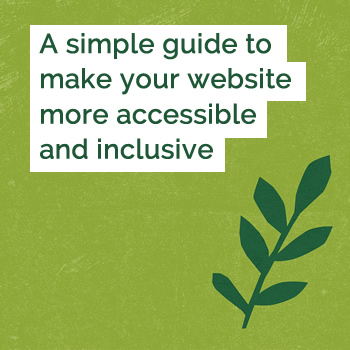 More so now than ever is it pertinent to make sure our website content is accessible and inclusive to the diverse range of visitors we will hopefully receive.
More so now than ever is it pertinent to make sure our website content is accessible and inclusive to the diverse range of visitors we will hopefully receive.
This is a simple guide, so we are keeping it short and sweet here but at the end of this post are links to previous, more in-depth articles we have written on the subject.
Implement these steps and you can make a big difference to your website users' experience:
This has just been a really quick guide but to delve deeper, do check out:
Reducing digital exclusion in online content creation
How to make your social media content more inclusive
27th Feb 2023
I first became involved in Fairtrade about 15 years ago when I joined our local Fairtrade campaign group to achieve Fairtrade Borough status for our local area (we did it).
Back then we spoke to various business owners, retail staff and the general public about Fairtrade. Awareness was a little patchy, even though quite a few high street shops were selling products that carried the Fairtrade mark. However, when we held stalls at public events it was encouraging to hear that children and young people were very knowledgeable about Fairtrade, what it meant and why it was important. On those occasions the young people would educate the the older generations on the issue and we stood back, impressed by their understanding and enthusiasm.
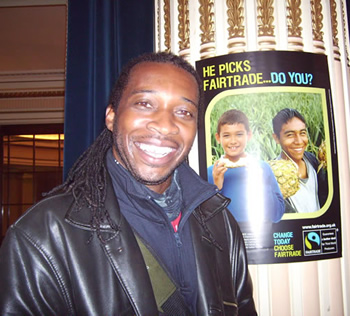 Around the same time, I also met a Fairtrade banana farmer called Gideon, from Saint Vincent. He told me what a difference the living wage pay through Fairtrade had meant to him, his family and fellow farmers. I still think of Gideon sometimes and wonder how things are for him or the proceeding generation of farmers now. Fairtrade is as necessary as ever and the climate crisis is an even bigger concern than before, making produce like bananas, coffee and cocoa harder to grow. And today those well-informed young people at our Fairtrade stall may have children of their own and will be hoping for a healthy and secure future for them.
Around the same time, I also met a Fairtrade banana farmer called Gideon, from Saint Vincent. He told me what a difference the living wage pay through Fairtrade had meant to him, his family and fellow farmers. I still think of Gideon sometimes and wonder how things are for him or the proceeding generation of farmers now. Fairtrade is as necessary as ever and the climate crisis is an even bigger concern than before, making produce like bananas, coffee and cocoa harder to grow. And today those well-informed young people at our Fairtrade stall may have children of their own and will be hoping for a healthy and secure future for them.
So, the theme of this year’s Fairtrade Fortnight seems particularly pertinent as it highlights the harmful effect that the climate crisis has on food production and the livelihoods of farmers in the places worst affected by climate change and financial hardships.
Unjustly, those affected by climate change the most are often those who contribute to it the least. Additionally, some of the foods we love and consume every day are under threat because of the climate crisis. Less fertile land, extreme weather and disease are causing failing harvests and putting farmers under even more pressure in what is an already incredibly difficult situation. In the current financial crisis many people can relate to the worry and stress of providing for the basic needs of themselves and their families due to circumstances out of their control. For many farmers in low-income communities overseas they also must pay for healthcare and their children’s education on top of other living costs.
Social and environmental issues don’t exist in isolation and it makes sense that they are tackled together. As well as farmers getting a fair price for their produce and a premium for them to invest, Fairtrade provides advice and training on sustainable farming techniques and climate resilience via producer networks around the world. Farmers also work to eco-friendly Fairtrade standards which involves protecting biodiversity, reducing carbon and working towards a ban on deforestation.
Emilia Debrah’s story is a great example of this in action
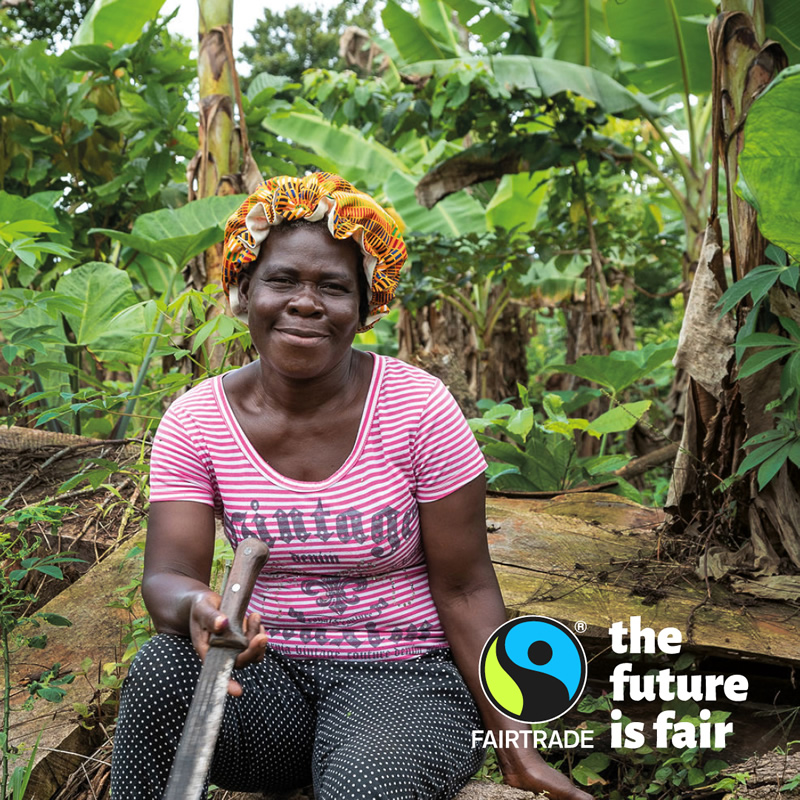
Emilia Debrah (pictured above - photo credit Chris Terry) is a Fairtrade cocoa farmer in Ghana. Emilia has a flair for farming but despite this, her income from cocoa before 2018 was so low that she fell into debt and struggled badly for a while. What turned her finances around, she says, is the support she got from the Fairtrade co-op she belongs to and training as part of a project where she learned to farm her four hectares of land more productively.
She’s now almost self-sufficient thanks to her newly created ‘micro-forest’ and can sell the vegetables she intercrops with cocoa locally. The savings she’s made on pesticides help protect Emilia, and her six grandchildren she cares for, against rising living costs.
That’s why climate justice and Fairtrade go hand-in-hand and why here at Make Hay and Green Hosting we continue to support Fairtrade in our shopping choices.
The Fairtrade Foundation suggests other ways we can support farmers like Emilia, the future of our food and the natural world:
Fairtrade Fortnight 2023 campaign
Fairtrade and Climate Justice